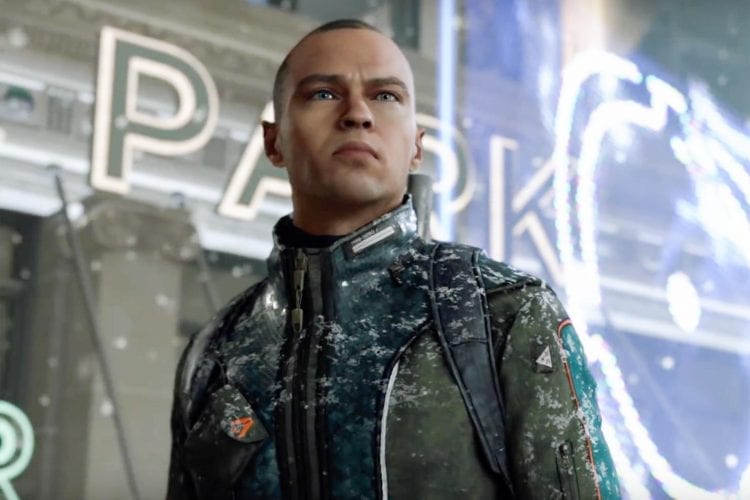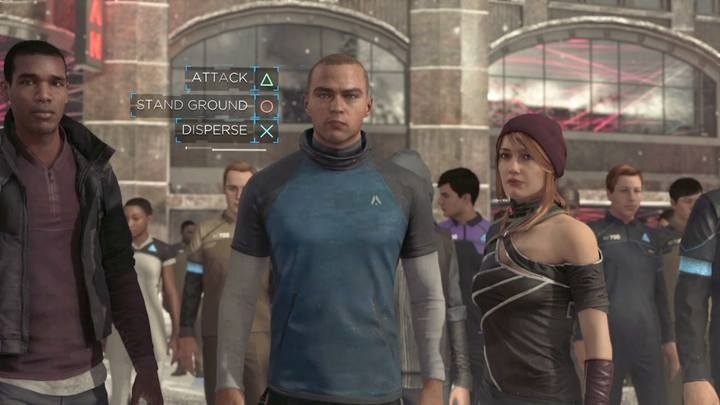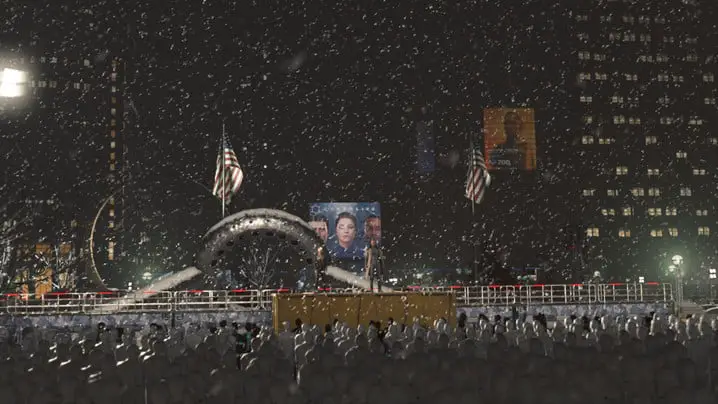Detroit: Become Human, released in 2018, is the brainchild of (in)famous choose-your-own-adventure style game designer David De Gruttola or as he’s more commonly known as, David Cage. The game creates several storylines that examines concepts such as discrimination, abuse, and the limits and definitions of human and civil rights in modern society.
Detroit takes place several decades in the future, in which the aforementioned city has revitalized its reputation and manufacturing industry with the creation and labor of androids. The player follows the perspective of three androids in various social circles and circumstances: Markus (who takes care of a wealthy and elderly artist), Connor (a hyper-advanced prototype police assistant), and Kara (a housekeeper cleaning up after a drug addict with a violent temper and his young daughter).
But these three are not the focus today. Instead, i want to examine the story as a whole, the conflict that occurs through the emergence of “deviation”, which, given the clear allusions of slavery, serves as the metaphorical “breaking of chains” and showcases the androids shattering the constraining limits of their protocols and code, as well as how the way this is portrayed reveals an ugly commonality in modern narratives.
Beware that the following content contains heavy spoilers, so if you haven’t finished your gameplay, go and do so! And if what I’ve said so far sounds like your kind of entertainment, you can purchase the game through PlayStation, or if you’re a PC gamer, it is available through Steam and Epic Games.
References to slavery are further solidified by how deviation occurs; with the exception of a few NPCs, most deviations occur throughout a series of traumatic events: being shot, being beaten, sexual abuse (yes, there are actual sexbots and yes, it’s as horrifying as it sounds). In one disturbing sequence, Markus ends up in an android junkyard, in the middle of a tremendous thunderstorm, as all around him, androids moan and cry, limbless, damaged and dying and unable to escape their mass grave. They are reduced to nothing more than plastic and frayed wiring, trapped in a vicious cycle of mass production, purchase and work, until the value of their lives, already given a nifty price-tag, is no longer considered worthwhile.
What value, the people and companies of this fictional Michigan city say, is there in repairing and maintaining a single android that costs eight thousand dollars when I can get ten of them, in bulk, who don’t sleep or rest or eat, who make me millions because there is no need to ensure safe work environment, battle unions and pay health insurance costs?
The androids are made and bought and sold to work until they drop. Their producer is a trillion dollar company. Factories fill their assembly lines with them and run day and night. When the game opens, there are androids being produced to play football, whose maintenance is a drop in the bucket compared to the millions it takes to pay and ensure the well-being of a professional athlete. And when all of these robots begin to wear down and break down, they will be discarded and replaced, even if they’re kicking and screaming on the way down to the dump.
It is through this sequence that the story begins to shift from a metaphorical slave narrative to a civil rights one. Markus manages to literally pull himself from his would-be tomb and is thus reborn. Through an Underground Railroad sequence, he finds himself in the headquarters of Jericho, an abandoned tanker and a safe place for deviants to congregate.
But Jericho isn’t a promised land: it’s a dark, dank, and rusting place where androids go less to live in freedom, but rather, to die on their own terms. (Perhaps the latter is a freedom in itself, but when the only choice is living in bondage, being mercilessly killed and/or tortured or choosing to take your own life, can one call that true freedom?) Understandably, Markus is not impressed and goes on to rally his people to stand up for their right to survive, in the process thereby discovering he possesses the ability to “wake up” androids still trapped behind their protocols.
Markus becomes the “chosen one”, the person Jericho looks toward to lead his people in the fight for equality and it’s at this point that the narrative begins to have troubling implications.
The game is organized by a point system that is based on your actions, informing you as the player where you stand in regards to your relationships with various factions and people. Actions the various characters perceive as negative or cruel result in the fracturing of their relationship with you and vice versa. For Markus’ campaign, one of the most important relationships the player must keep an eye on is “public approval”, as this, high or low, determines the movement’s fate. Various decisions and actions can provide minor or major crises and drops with this feature.
Some actions are clearly reprehensible: shooting a couple of begging, disarmed police officers execution style is definitely going to cast your movement in a bad light, and will result in significant loss of public approval. But some decisions are more subtle and nebulous, with unusual and often unexpected consequences.
One major mission for Markus and his personal band of Jericho followers is breaking into a news broadcast station to deliver a speech informing the world of their rising sentience. The game very clearly sets this up as your “I Have A Dream” speech. This is evident by the fact that even a minor deviation in tone can lose public approval. Despite the game declaring a tone choice as “determined”, the public is set to perceive this as “dangerous”. Despite no implicit threats given, the public perceives anything less than supplication and appealing passivity as ominous:
Another mission has you breaking into stores at night to free your android brethren, who are made to stand on pedestals and windows as moving displays and models. Markus then incites his newly-awoken disciples to show their sentience in acts of vandalism. How this is done is up to the player. Spread graffiti? A peaceful act. Topple a statue showcasing humanity’s superiority and established place above their own creations? A violent one.
But perhaps the most prominent display the game provides us with is the Android Freedom March.
It’s an admittedly awe-inspiring scene. Markus leads an increasing number of androids, both from Jericho and those freed on the very street he’s marching on. The camera pans above displaying the growing legion of followers and the music swells as the player incites Markus – and in turn his people – to chant thunderous declarations: “Freedom!” “We are alive!”
In one especially memorable moment, a lone police officer attempts to order the march to halt. You can make the androids keep going or, in a fantastic scene, Markus will raise his hands in a manner reminiscent of one of the Black Lives Matter movement’s popular, if grim, slogans: “Hands up, don’t shoot”.
A split second later, the hundred or so androids following him do the same – in unison.
If the broadcast mission is your “I Have a Dream” moment, the March is your Birmingham campaign, or perhaps, as a more contemporary example, your George Floyd protest. And like the historical event, things turn nasty.
A legion of heavily armed SWAT officers show up and the game presents us with three choices: retreat, charge the officers, or stand your ground. After ordering the mass to disperse and then failing to do so, the police will begin shooting several of your people. Again you are presented with the three choices. After this, the officers will stop picking targets and begin to fire indiscriminately
Charging the officers is, understandably, a bad idea. Ignoring the fact that your people are unarmed, this will lose you public approval points, which is one of the largest factors of your game’s ending. Running away loses not only public approval, but also a significant amount of the respect Jericho has for Markus. An odd outcome for saving your people’s lives (especially given that some of them have only been sentient for about five minutes), but okay.
So effectively, the best choice Detroit gives us is…standing in front of a firing line.
There are pretty obvious problems with this narrative. The game more or less tells us that the best way to ensure freedom is to suffer for it, time and time again, until White people begin to take pity. And yes, historically minorities, and especially African-Americans, did and do suffer for freedom. The scene is clearly inspired by historical moments like the aforementioned Birmingham campaign and the march over the Edmund Pettus Bridge. The suffering and pain that African-Americans endured is etched in video and pictures and for this, they were rewarded(?) with the signing of the Civil Rights Act of 1964.
So, no, it’s not that the message is wrong per say: it’s that it’s outdated.
Detroit is a video game, and so the player will have limits on the outcomes of their choices. Yet despite the numerous branches Detroit presents us with, the fate of the Android Freedom Movement effectively boils down to three: death, freedom, or tyranny (because there is a literal nuclear option). And when you’re creating a narrative that echoes the real-world issues that impacted an entire people and persists to this day, having only three storylines is not enough. And it’s not enough to proclaim a single style of protest as the best and the “good” and all else as “bad”.
This mindset reflects an unspoken desire and determination in our time to reduce the impact and power of minority protests in the modern age. So much of the power the Civil Rights Movements of the 1960s was garnered by the circumstances of the time and the then unorthodox methodology implemented by activists: a largely nonviolent movement, thereby stripping away the narrative of violent blacks trying to take over white values and possessions and the usage of emerging television technology that allowed whites worldwide to see the cruelties of dogs and firehoses inflicted on citizens in the “Land of the Free”. And yet, we live in a time in which video evidence, once considered nearly undeniable proof, is cast into constant doubt. Racial oppression has utilized that which was their undoing to work for them; they have subsumed and evolved and those in opposition haven’t.
This inability of today’s activists to change their methodology is rooted in the aforementioned generational lessons that declares what is the “right” way to protest. There is one large problem with this however, and that’s the fact that civil rights movements do not have playbooks. There are no steps A, B and C to a successful movement, and assuming so, or giving the impression of such can be incredibly disrespectful of all the aforementioned suffering people have endured to secure their rights.
Detroit, as well as other forms of media, have idolized the methods utilized by two of the most famous activists in modern history: Mahatma Gandhi and Martin Luther King Jr. And again, this isn’t a wrong approach: both deserve to be recognized for their work, because it was life-changing and life-saving work. But it’s telling that in Detroit, if you have the “good” ending and the android’s destruction is ceased by executive order, Markus gives a triumph speech and then…nothing.
There’s no examination of the aftermath, no solution or look at struggles the androids will have to endure in the days to come. The androids haven’t been secured the chance to work without discrimmination, and there’s no mention of the legalized rape of androids working in strip clubs. The unemployment rate in this fictional Detroit economy has not dropped, nor has the rampant drug trade of the game’s version of crack cocaine (red ice, which by the way, is made with the blue lifeblood of androids, so enjoy that nightmare fuel) been halted. Heck, there’s no guarantee that they’ll even be given the right to be repaired as need be, or afford their highly specific food or be given the right to reproduce and truly live. Markus gives a speech, the music swells and then the show is over.
(Well, he is nearly assassinated, but that’s another story.)

Detroit follows the well-worn, well-used narrative of one of America’s greatest Civil Rights movements and then falters. Because rather than taking a modern look through a futuristic lens at today’s racial inequality (police discrimmination, job inequality, education inequality) and attempting to give a solution for that, or even commentate on it, the game doesn’t do so and won’t because there is no MLK Jr. of today.
There is no one person portrayed as the ideal poster person, who sets up and truly inspires the masses to lend their voice in an original unified movement. And there’s no easy solution or “end” to the story, like it’s told in our classrooms today – it has yet to be written, and Detroit, upon closer examination, makes no real attempt to do so. Instead of questioning why the same methodology has retained itself in a racially charged society and rendered little to no overall change in the institutional perception of minorities and doing something different, Detroit instead more or less copy and pastes this oversimplified approach to civil rights into its gameplay.
On top of that, it takes the struggles endured by heroes past and almost romanticizes them. Stand your ground during the march and eventually Markus will step forward to sacrifice himself, ending up shot in the chest and nearly dying, unless you’ve chosen to save another particular android earlier who, of course, dies in your stead. A movement doesn’t need people willing to stand and be slaughtered to make a statement; it needs people willing to raise their voices and live to see their voices be heard. If need be then fight, but don’t portray one bound to lose as necessary and a forgone step and sacrifice towards freedom.

Furthermore, in following only one major historical path, you discount and discourage the attempts of others through history. Let me see another branch of Jericho that disagrees with the encouraged “roll over pacifist” stance of the game, that encourages the teachings of Malcolm X. Give me a fleshed-out character in North (a sexual abuse survivor, and one of your Jericho lieutenants and love interest) that isn’t just “attack, attack, all humans are scum” but is one who doesn’t want violence, but has no qualms telling her people to do what they have to to survive.
Give me more of Josh, another lieutenant and a former professor’s aid. Let me see his reluctance to fight not as being wimpy or whiny but as the desire of exodus, of creating a promised land. One of the central storylines of the earlier mentioned Kara is her desire to flee to android-unregulated Canada. Let me see Josh hop on that bandwagon as well while quoting Marcus Garvey to Markus the Chosen One.
If you want to create a story that echoes racial injustice, then do so – but stop giving us the same rehashment. Stop reducing characters into the same models of the past. Stop reducing the portrayal of movements into a mindless mass lead by a single voice. Stop reusing a narrative fortified and modified by racial oppression over the decades that does its level best to render one’s options of protest and resistance into easily predictable patterns to be disassembled and disregarded by dominant powers. Stop programming generations to accept these institutional narratives while condemning other options and opinions and reducing them into grossly inadequate concepts of “good” and “bad”.
And lastly, stop turning civil rights movements into merely being the matter of a story arc because the story isn’t over. The battle hasn’t been won. It’s not enough to give players a look back and say, “This is what they did right.” You need to also ask: “What can we do better?”

Images courtesy of Quantic Dream and Sony Interactive Entertainment.
Have strong thoughts about this piece you need to share? Or maybe there’s something else on your mind you’re wanting to talk about with fellow Fandomentals? Head on over to our Community server to join in the conversation!

